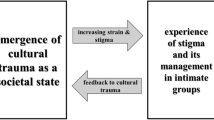Abstract
This essay explores forms of religious narrative that shape self-understanding and engagement with the world through the idea of redemption. An analysis of the landscape of religious perspectives within the context of globalization shows a bifurcation between competing notions of redemption in fundamentalist and postmodern narratives. Where fundamentalism uses meta-narrative that is hyper-theistic, postmodernism uses contextual narratives that deconstruct narrative and can lose a sense of the transcendent. The purpose of the essay is to show how these two competing notions can become entrenched and destructive to the very redemption they seek. Using Paul Tillich’s understanding of courage, these positions are placed into a dialectical tension that points to a third understanding of redemption as the perpetual mediation between the desire for belonging to a community and the desire to recognize the limitations of any individual or community’s perspective and understanding of the world in relationship to the holy.
Similar content being viewed by others
References
Ammerman, N. (1987). Bible believers: Fundamentalists in the modern world. New York: Rutgers.
Augustine. (1997). Confessions. New York: Vintage Spiritual Classics.
Berger, P. (1967). The sacred canopy: Elements of a sociological theory of religion. New York: Anchor Books.
Coreno, T. (2002). Fundamentalism as a class culture. Sociology of Religion, 63, 3.
Ehret, V. (2013). Uncanny courage and theological home. In D. Boscaljon (Ed.), Uncanny homecomings in religion, narrative and the arts. Surrey: Ashgate Publishing.
Juergensmeyer, M., et al. (2001). The global rise of religious nationalism. In D. Hopkins (Ed.), Religions/globalizations: Theories and cases. Durham: Duke University Press.
Klemm, D., & Schweiker, W. (2008). Religion and the human future: An essay on theological humanism. Oxford: Wiley-Blackwell.
LaHaye, T., & Beverly. (1989). Christian children persecuted in America. Fundamentalist Journal, 8, 51.
Lenz, R. (2011). Intelligence briefs. Intelligence Report, 141, 5.
Marty, M & Appleby, S. (Eds.) (1991). The fundamentalism project: A user’s guide in The fundamentalism project: Fundamentalisms observed. Chicago: University of Chicago Press.
Niebuhr, H. R. (1951). Christ and culture. New York: Harper Collins.
Plato. (2005). Phaedrus’. In E. Hamilton, H. Cairns, & L. Cooper (Eds.), The collected dialogues of Plato (7th ed.). Princeton: Princeton University Press.
Schleiermacher, F. (2002). Soliloquies. Oregon: Wipf and Stock.
Steger, M. B. (2009). Globalization: A very short introduction. Oxford: Oxford University Press.
Taylor, M. C. (1984). Erring: A postmodern a/theology. Chicago: University of Chicago Press.
Taylor, M. (2004). Confidence games: Money and markets in a world without redemption. Chicago: University of Chicago Press.
Tillich, P. (1952). The courage to be. New Haven: Yale University Press.
Tillich, P. (1957a). Dynamics of faith. New York: Harper One.
Tillich, P. (1957b). Systematic theology volume II. Chicago: University of Chicago Press.
Vanhoozer, K. (Ed.) (2003). Theology and the condition of postmodernity: A report on knowledge (of God) in The Cambridge companion to postmodern theology. Cambridge: Cambridge University Press.
Author information
Authors and Affiliations
Corresponding author
Rights and permissions
About this article
Cite this article
Ehret, V.M. Globalization, Redemption, and the Dialectics of Courage. SOPHIA 53, 67–80 (2014). https://doi.org/10.1007/s11841-013-0379-8
Published:
Issue Date:
DOI: https://doi.org/10.1007/s11841-013-0379-8



